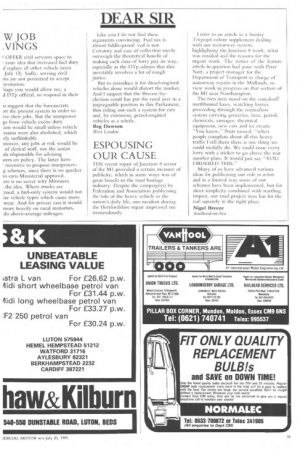W JOB .VINGS
Page 31

If you've noticed an error in this article please click here to report it so we can fix it.
r OFFER civil servants space to your idea that increased fuel duty d replace all other vehicle taxes July 13). Sadly, serving civil its are not permitted to accept invitation_ 'haps you would allow Inc. a d DTp official, to respond in their
u suggest that the bureaucrats n-t the present system in order to rye their jobs. But the manpower gs from vehicle excise duty :ion would be small unless vehicle :ration were also abolished, which .ely unthinkable..
)reover, any jobs at risk would be of clerical staff, not the senior als responsible for advising iters. on policy. The latter have
• incentive to propose manpowerg schemes, sincethere is no quicker to earn Ministerial approval. ere is no secret why Ministers : the idea. Where trucks are
'.rried, a fuel-only system would not _ise vehicle types which cause more wear. And for private cars it would more heavily on rural motorists, do above-average mileages. Like you I do not find these arguments convincing. Fuel tax is almost fiddle-proof: ved is not. Certainty and case of collection surely outweigh the theoretical benefit of making each class of lorry pay its way, especially as the DTp admits that this inevitably involves a lot of rough justice.
But to introduce it for diesel-eng,ined vehicles alone would distort the market. And I suspect that the Brecon byelection result has put the rural user in a impregnable position in this Parliament, thus ruling out such a system for cars and, by extension, petrol-engined vehicles as a whole.
Reg Dawson
West London




















































































